The reboot of Battlestar Galactica is well recognized for its portrayal of nontraditional gender roles within its human and nonhuman societies. I’ve been watching some of the commentaries lately because they give special insight into the decisions that were made concerning gender roles on the show. Several of my nerd passions converge in this blog post, in which I bring you a transcript (with minor edits for clarity and relevance) of part of the commentary for Season 3, Episode 17, “Maelstrom.”
[Spoiler Alert! The commentary and I discuss events from the first three seasons of the show, but not after.]
Speaking: creator and executive producer Ron D. Moore and his wife, Terry Dresbach
Scene: Starbuck and Anders, getting dressed
Ron D. Moore: [We wanted to address the question,] where was [Starbuck’s] relationship with Anders, you know, the guy who had tried so hard to stay in the picture, who was willing to come sleep with her even though she wasn’t holding out anything more than that. And who was still her husband, still around, but obviously frustrated, obviously sort of at a crossroads in his own life, and not quite knowing what the hell to do.
Terry Dresbach: You know, there are so many women who do that– with men– who are willing to just continue on, whatever they can get in hopes that they’ll just change their mind. There’s a lot of response that by switching it you’ve made Anders just a complete, you know, wuss.
RDM: Well that is an interesting observation on the show because I do hear comments […] that the show on some level has switched the gender roles and that all the women on the show are strong and all the men on the show are weak. And people get annoyed that the men are such pusses and the men are always the last ones to figure things out, and the women make all the strong decisions […] I don’t know. That’s fair. I think that’s all fair. That’s a fair criticism. I don’t know that that’s—I don’t know that there’s anything wrong with that.
TD: I don’t either.
RDM: And I feel like so what? That’s how this world operates.
TD: That’s what I was going to ask you, you know, this is a fictional world, and how do we know what their, their heritage is, in terms of sex roles, you know, sex and gender roles.
RDM: The sexual politics as it were of the show have always been such that—I don’t know why I got on this thing, but from a very early stage in the development process it was very important to me that the female roles be very very strong.
TD: Well, [otherwise] you would have to accept the premise that this is an absolute complete exact mirror of our world and thus women are always in the subservient position and men are always in the alpha position, and that’s not what the show’s ever been based on.
RDM: That’s not really what the show is. And it’s not really trying to make it a matriarchal society; I mean I don’t think that was ever the intention either. Women are still women, men are still men, but it’s how you play them dramatically– I think that’s what the observation is about– but as we played these characters in the drama, the women tend to have stronger moments, and the men tend to have more introspective ones, and the women tend to be more decision-makers and the men tend to, to sort of suffer more. And I don’t know that that’s a comment on the state of this society; it’s just a choice that we made as we tell the story.
TD: There are those who think that’s a comment on our marriage.
RDM: On our marriage?
TD: Yes. [laughing]
RDM: Yes. [laughing]. This is my outlet. I have been so brainwashed that this is how I think our world should be.
TD: I’m a tyrant.
————————————————-
Viewers are willing to accept that people in this fictional universe have figured out how to travel faster than the speed of light. They are fine with the idea that humans have created robots (Cylons) who then evolved into other robots that look and act so much like humans that it’s impossible to distinguish between them except at the microscopic level. Within this universe, humans can breed with these robots and produce children. All of that is perfectly acceptable. Yet the idea that humans who are so technologically advanced might have a society that looks slightly different from ours, a society in which the two genders (there are still only two, unfortunately) approach something like equality, is so far-fetched and troubling as to elicit a backlash.
Katee Sackhoff, the actress who plays Starbuck, received a death threat before filming even began and was resoundingly booed at the San Diego Comic-Con in 2004. Common descriptors for the character of Starbuck, both the original male role from the 1970s and the subsequent female one, are “swashbuckling” and “cigar-chomping” as well as references to heavy drinking and sexual promiscuity. Certain fans of the original series found these characteristics to be admirable in a man but so unacceptable in a woman that they tried to keep the show off the air.
I went looking for viewers who gave the kinds of complaints that Moore and Dresbach cite, and the first one who popped up was the original Starbuck himself, Dirk Benedict.
In one essay, titled Lost in Castration, Benedict offers such insights as this:
“There was a time, I know I was there, when men were men, women were women and sometimes a cigar was just a good smoke. But 40 years of feminism have taken their toll. The war against masculinity has been won. Everything has turned into its opposite, so that what was once flirting and smoking is now sexual harassment and criminal. And everyone is more lonely and miserable as a result.”
I find it interesting that Ron D. Moore used a similar phrase to describe his Battlestar universe: “Women are still women, men are still men.” I’m somewhat baffled at what Moore meant by this, but Benedict tells us his opinion outright: “Men hand out cigars. Women ‘hand out’ babies. And thus the world for thousands of years has gone’ round.” Well. Sci-fi being the genre dedicated to representing things exactly as they’ve been for thousands of years, of course.
Benedict goes on:
“One thing is certain. In the new un-imagined, re-imagined world of ‘Battlestar Galactica’ everything is female driven. The male characters, from Adama on down, are confused, weak and wracked with indecision, while the female characters are decisive, bold, angry as hell, puffing cigars (gasp!) and not about to take it any more.”
So yep, there’s the supposed weakness of the male characters Moore cited. Honestly, I didn’t really care for Apollo early on because I too thought he was a bit of a wuss. My main objection was that I assumed that, as so often happens in situations like this, they would eventually elevate his character to more of a tough guy so that he could “tame” Starbuck and they could live happily ever after in traditional gender role bliss, restoring that “natural order” that Benedict longs for. Gross. But! Whatever happens in their relationship (I won’t give it away), they do remain essentially the same people as when the series starts.
I grew to love Apollo’s character as he figures out what kind of person he should be, and actually distances himself further from some of the confines of traditional masculinity. He shows that there are many ways to be “strong” and a leader, including being self-reflective, concerned for others’ wellbeing, and standing up for what is fair and just. In other words, he does embrace characteristics that are traditionally “feminine” just as Starbuck continues to be traditionally “masculine” in some ways: headstrong, dominant, and willing to take risks. Understanding all of this now, I see that it was my own internalized sexism that prevented me from enjoying Apollo’s character from the very beginning.
As Moore and Dresbach point out in that commentary, this swapping of traditional gender roles does not make a matriarchy. It would seem that way to those, like Benedict, who are unapologetically invested in a patriarchal system. But rather than just putting women on top, the rebooted Battlestar universe is probably the closest thing to post-gender that I’ve seen represented in mainstream culture.
The show has received ample praise for having women play the President and the best fighter pilot, but is perhaps under-appreciated for the depth and range of the roles played by men. It is harmful to everyone in society to claim that men can never be confused, can never show emotion, can never take the role of caregiver, and that any who do these things are “weak.” Vulnerability is not the same as weakness. Portraying men with these characteristics as successful leaders is one of the greatest contributions the show makes towards gender equality.
I’ll leave you with two fun montages: Starbuck set to Peaches’ “Boys Wanna Be Her”
and Apollo set to The Format’s “On Your Porch”

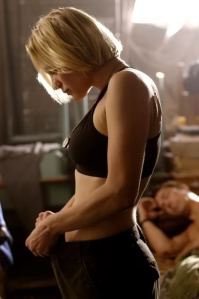
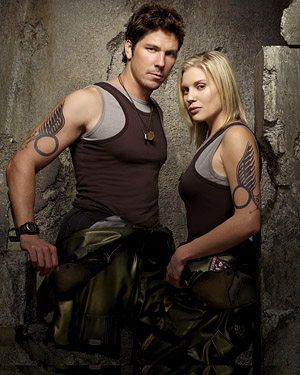
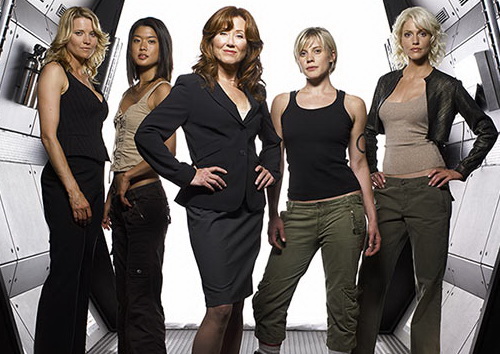
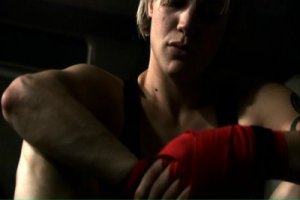
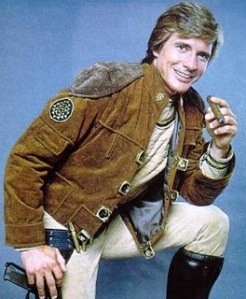
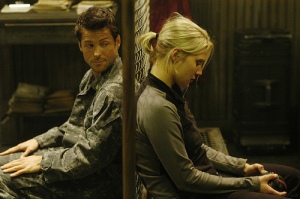
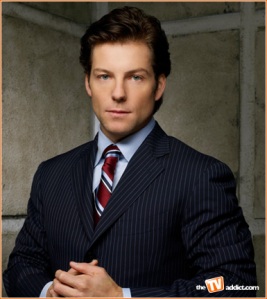
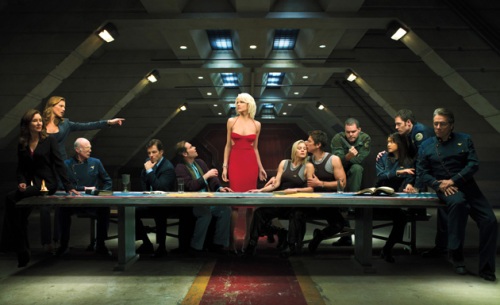
I’m here from the Shakesville blogaround, and just wanted to say…this is awesome. I think you hit the nail on the head with this post. And I agree that part of what’s so interesting about the show is the way the men are written. I love BSG for recognizing that you can’t just make female charaters “stronger” — a functional society needs that balance, and if you’re going to let the female characters get stronger (which is awesome), you’re going to need to let the male characters become more vulnerable (which is also awesome, but much less common in tvtropesland).
I’m off to rewatch some BSG clips, now:) Thanks.
Thanks for reading and for commenting. I’m glad you enjoyed the post!
All the things you mentioned are the reasons I loved the series. Well, not the ending, but the characters.